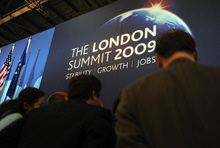
Typical street scene in Santa Ana, El Salvador. (Photo: iStock)
IMF Survey: G-20 Backs Big Boost to IMF's Financing
April 2, 2009
The Group of Twenty (G-20) industrialized and emerging market economies backed a big boost to the IMF’s financing capacity as part of measures to counter the global economic crisis, and called for further revisions in country representation in the 185-member institution.

G-20 called for doubling of IMF lending capacity to low-income members, global liquidity boost through SDR issue (photo David Wimsett/UPPA)
GLOBAL ECONOMIC CRISIS
IMF Managing Director Dominique Strauss-Kahn welcomed the commitments made by the G-20 nations to bring the world economy out of its deepest post-war recession, including through steps to enhance the Fund’s ability to support emerging markets and low-income countries, and to boost global liquidity. Speaking after the April 2 summit meeting, he also welcomed the leaders’ agreement to support global growth and strengthen financial regulation.
“The global crisis is hitting emerging market and poor countries hard,” the Managing Director said. “The G-20 leaders have today sent a powerful signal that the international community is committed to support these countries, including by ensuring that the IMF has the tools to act.”
The G-20 leaders, whose countries generate about 80 percent of global output, agreed to make available immediately an additional $250 billion for the IMF to lend. This would later be incorporated into a more flexible New Arrangements to Borrow (NAB), expanded by up to $500 billion in total.
Help for low-income countries
Meeting in London, the leaders also called for a doubling of the IMF’s lending capacity to its low-income members, and for a boost to global liquidity through a $250 billion issue of the Special Drawing Rights (SDR) reserve asset. To enhance the voice of emerging markets and developing countries in the IMF, the G-20 urged accelerated review of IMF quotas, which reflect country representation at the IMF.
In this context, Strauss-Kahn welcomed the backing given to the IMF’s new Flexible Credit Line (FCL), a precautionary credit line launched by the IMF last month to buttress strong economies against fallout from the global crisis. “I am very pleased by the support demonstrated by the G-20 leaders to the FCL. Mexico has decided to seek an FCL arrangement and I am looking forward to rapid take-up of this new facility by other countries,” Strauss-Kahn said.
“I am also particularly grateful for the support from the G-20 to a doubling of the IMF’s concessional lending capacity for low income countries. The IMF will bring forward by the Spring Meetings proposals to achieve this," Strauss-Kahn added.
IMF to track global crisis response
Strauss-Kahn noted the G-20’s call on the IMF to assess the global actions required to support world growth.
“The IMF has a unique capacity to analyze the relationships between financial markets and the real economy, with a global perspective given its membership. Our global and country monitoring procedures are being sharpened, including with a new mechanism for early warnings,” Strauss-Kahn said.
“It is also key that the G-20 has confirmed the acceleration of quota reform to early 2011. This demonstrates a renewed commitment to the importance of governance and legitimacy in the global architecture,” he said.
The G-20 comprises 19 countries: Argentina, Australia, Brazil, Canada, China, France, Germany, India, Indonesia, Italy, Japan, Mexico, Russia, Saudi Arabia, South Africa, South Korea, Turkey, the United Kingdom, and the United States, plus the European Union, represented by the rotating Council presidency and the European Central Bank. The Managing Director of the International Monetary Fund and the President of the World Bank, plus the chairs of the International Monetary and Financial Committee and Development Committee of the IMF and World Bank, also participate.
Comments on this article should be sent to imfsurvey@imf.org


